- Home
- Beverly Cleary
Henry and the Clubhouse Page 5
Henry and the Clubhouse Read online
Page 5
“There,” said Ramona. “I guess we crossed him out.”
Henry did not know what to make of this and did not have time to give the matter much thought, because Bobby started to crawl out of the kitchen. Henry did not know how old Bobby was, but he knew he couldn’t be very old, because he was wearing diapers, plastic pants, and a T-shirt. In one hand he carried a piece of toast. Henry had never seen a baby drool as much as Bobby. As he crawled he left little puddles on the floor.
Henry heard Mrs. Kelly’s footsteps going up the stairs. Bobby dropped his toast on the floor. Lisa and Ramona giggled over some private girl joke. Kermit spun the egg beater and made a noise like machinery with his mouth. The washing machine churned. A dog walked into the kitchen, picked up Bobby’s toast, and dropped it again. It did not look as if anyone would get into trouble, but just the same Henry hoped their mother would hurry back. He was a paper carrier, not a babysitter.
Bobby picked up the soggy toast the dog had dropped and began to chew it. “Hey,” said Henry feebly. He was pretty sure babies were not supposed to eat toast that had been in a dog’s mouth. Gently he tried to take the toast from Bob, who clung to his crust and uttered a piercing scream. Henry backed away. Bobby put the toast back in his mouth and gnawed contentedly. Oh well, thought Henry, it looks like a pretty clean dog.
Then Henry discovered Kermit was missing. He stepped into the living room, where Kermit was twirling the egg beater, in time to see the dog lap up the soggy breakfast food in the bowl on the coffee table. “Cut that out,” said Henry even though it was too late to do any good.
The washing machine stopped swish-swashing and was silent as if it was resting up before starting to spin.
Mrs. Kelly called down from upstairs, “Kermit, what did you do with my purse?”
“I put it under the bed so Bobby wouldn’t get it,” answered Kermit.
Henry heard a chair being dragged across the kitchen floor. Followed by Kermit and the dog he went back to investigate. Ramona was standing on a chair in front of the washing machine. She was not actually doing anything wrong, but knowing her, Henry was not taking any chances. “You better get down from there,” he said.
“Pooh,” said Ramona.
The washing machine gave a loud click and started to spin. Ramona reached toward the lid.
“What do you think you’re doing?” Henry spoke more forcefully this time.
“I don’t have to mind you,” Ramona informed him. “You’re just an old boy.” She lifted the lid of the washing machine to peek inside. Instantly dirty water and detergent spun out of the machine with a great whoosh, hitting Henry right in the face, drenching Ramona, and spraying the whole kitchen.
“Cut that out!” yelled Henry, snatching Ramona off the chair and slamming down the lid of the washing machine, but not until the jet of dirty water had circled the kitchen several more times.
All the children were howling with fright and Ramona howled the loudest. The dog shook himself and began to bark. Henry mopped his face with his damp sleeve and looked around at the rivulets of dirty water trickling down the walls and cupboard doors onto the floor. It was a wet, sloppy mess, and there was no time to clean it up. “What did you have to go do that for?” he demanded of Ramona, as Mrs. Kelly’s feet came thumping down the stairs.
Ramona, who was dripping with dirty water, stopped howling and looked sulky. “I just wanted to see what it looked like inside when it was spinning,” she said.
Disgusted as he was, Henry felt a small flash, a very small flash, of understanding for Ramona. He had always been curious to see a load of spinning clothes, too.
“Oh, my goodness!” exclaimed Mrs. Kelly from the doorway as she looked at the wet children and dripping walls. The children’s howls subsided when they saw their mother. “What on earth happened?”
“I’m awfully sorry,” Henry apologized. “I tried to stop Ramona, but she lifted the lid of the washing machine before I could get to her.” He glared at Ramona, who made a face right back at him.
“Tattletale,” said Ramona.
Maybe he was a tattletale, but Henry didn’t know what else he could have told Mrs. Kelly. She would know the washing machine did not open itself. “I’ll help wipe it up,” he offered, feeling this was the least he could do.
Mrs. Kelly looked around her dripping kitchen. “Oh well,” she said with a sigh. “I suppose I should wash down the walls sometime. No, don’t bother to help. You just take Ramona home so she can get cleaned up and into some dry clothes.”
“OK…” Henry tried to sound willing. “I’m sure sorry, Mrs. Kelly. I’d be glad to come back and help clean up.”
Mrs. Kelly managed a smile. “No thank you, Henry. You’ve done enough already.”
Henry was not at all sure how she meant this remark. “Come on, Ramona,” he said, anxious to get away.
Outside, Ramona pushed her wet hair back from her forehead so it wouldn’t drip into her eyes and said, “I can go home by my own self.”
“That’s all right with me,” said Henry crossly. He knew that now that Ramona went to kindergarten, she was allowed to cross all but the busiest streets alone.
Ramona went her way and Henry went his. When he came to Klickitat Street he found Mrs. Peabody out raking up leaves from her lawn. Ranger, who was lying on the porch, looked suspiciously at Henry, but did not move.
“Why, Harry Higgins!” she exclaimed. “You’re all wet.”
“Yeah, I know,” said Henry sheepishly. He was trying to find a polite way to let Mrs. Peabody know his name was not Harry Higgins. Then his thoughts began to leap. Mrs. Peabody. His paper route. The money for the Journal. He had forgotten to get the money from Mrs. Kelly!
Henry’s thoughts were in a turmoil as he walked down the street. He could not go back and ask Mrs. Kelly for the money after what had happened. He would just skip the whole thing and pay for the Kellys’ papers himself. Nobody would ever know the difference. No, he wouldn’t either. He would never save enough for a sleeping bag if he did that. Yes, he would, too. He could never, never bring himself to ring that doorbell again. Yes, he could. No, he could not. That Ramona! She was the cause of all this. A little old kindergartner.
That settled the matter for Henry. He was not going to let a girl in kindergarten keep him from getting the money he had coming to him. Henry turned around and started back toward the Kellys’ house.
“Well, Harry, did you forget something?” asked Mrs. Peabody.
“Yes, I did,” answered Henry, managing to sound polite. He was so disgusted with Ramona that he felt like snapping at the whole world. First she had told Mrs. Peabody only she could prevent forest fires, and now this. If she ever caused him any more trouble on his paper route he would…he would…do something. What he would do he did not know.
Henry marched straight up the steps and rang the Kellys’ doorbell.
Lisa looked out of the window smeared with little fingerprints and screamed, “Mommy, it’s that boy again!”
When the door opened, Henry was the first to speak. “Mrs. Kelly, I am sorry to bother you again, but I didn’t get the money for the paper when I was here before.” He was still so disgusted with Ramona he forgot to be embarrassed.
“I thought you would be back.” Mrs. Kelly laid down the cellulose sponge in her hand and picked up her purse, which was lying on a chair near the door.
Henry accepted the money and gave Mrs. Kelly a receipt. Whew, he thought, I hope I never have to go through this again. And he decided he had better make sure that he did not. “Uh…Mrs. Kelly,” he ventured, “what day would be best for me to collect?”
“The first Saturday of the month,” answered Mrs. Kelly. “That is payday.”
Henry pulled his route book out of his hip pocket and made a note after the Kellys’ name. “Collect 1st Sat.” There. That ought to show Mrs. Kelly he could be businesslike. “Thank you,” he said, and once more started for home. Now he did not care if he was damp and dirty. He had actually
collected from every single one of the forty-three customers on his route. The job was finished until the first of next month and now he could go back to working on the clubhouse.
“Did you get what you went after, Harry?” asked Mrs. Peabody as Henry passed her house for the third time that afternoon.
“I sure did.” Henry was now feeling so confident that he was certain someday he would be able to find a way to let Mrs. Peabody know his name was not Harry Higgins. He would even find a way to keep Ramona from causing him trouble on his route. He would find a way to keep her away from the clubhouse, too.
Henry realized that it was now too late for him to do any work on the clubhouse this afternoon. Tomorrow afternoon the first thing he would do was make a sign saying, “No girls allowed.”
The only thing wrong with this idea was that Ramona could not read.
5
Ramona and The Clubhouse
Whenever it was not raining, Henry and his friends worked hard on the clubhouse. They measured and sawed and nailed, according to Murph’s plan. When Henry was delivering his papers he noticed that one of his customers was having his roof covered with asphalt shingles, and he was able to persuade the workmen to give him enough leftover material to shingle the roof of the clubhouse. He bought two big hinges, so they could have a door that would really open and close.
Beezus and Ramona and sometimes Lisa came over almost every day to watch the progress of the building. They stayed until time for the Sheriff Bud program on television, which Ramona never missed.
“I could help,” offered Beezus. “I bet I can drive nails.”
“No girls allowed,” said Murph curtly.
“I could make curtains for the windows,” suggested Beezus.
“Who wants curtains?” answered Henry, who would have been willing to let Beezus help, because for a girl she was pretty sensible, but when a boy is working with other boys he sometimes feels he has to act the way they do.
So Beezus sat on the Hugginses’ back steps and watched, while Ramona amused herself. Ramona never had any trouble keeping herself entertained. She climbed to the top step and began to count, “Ten, nine, eight, seven, six, five, four, three, two, one. Blast off!” Then she jumped to the ground.
“I know where I could get an old doormat,” suggested Beezus hopefully.
“What’s the use of having a clubhouse if you have to wipe your feet like in a regular house?” asked Robert.
It was not possible for Beezus to make a suggestion that would please the boys. “Get lost,” said Murph rudely.
“Well, all right for you, smarty!” It was easy to see that Beezus’s feelings were hurt. “Mess around with your old boy stuff. See if I care! Come on, Ramona, let’s go home. It’s almost time for Sheriff Bud.”
Ramona finished blasting off and trotted along home with her sister.
Henry was really sorry to see Beezus’s feelings hurt, but he did not like to say so in front of the other boys, who were too busy installing the real glass windows to pay any attention to what had just happened.
While the boys worked, Murph began to recite some strange sounds. They were not words, so Henry and Robert had trouble catching exactly what it was he was saying. The syllables, whatever they were, had a catchy sound and rhythm.
“Say that again, Murph.” Henry found himself wanting to make the sounds himself.
Once more Murph rattled off the syllables. This time Henry caught a beep and a boom.
“Hey, that sounds keen,” said Robert. “Where did you learn that?”
“From my cousin in California,” answered Murph. “He learned it from a lifeguard.”
“Say it again and slow down,” said Henry. “I want to learn it.”
Murph laid down his hammer and recited slowly and distinctly.
“Fadatta, fadatta, fadatta,
Beepum, boopum, bah!
Ratta datta boom sh-h
Ahfah deedee bobo.”
Henry and Robert laid down their tools, too. “Fadatta…fadatta…fadatta.” They began slowly at first but in a few minutes they had mastered the sounds and could rattle them off as fast as Murph.
“Hey, I have an idea!” Henry was enthusiastic. “We could be a club and use it for our secret password and always say it so fast other kids couldn’t learn it.”
“Sure,” agreed Robert. “All the kids will want to learn it and we won’t teach it to them.”
“Especially girls.” Murph picked up a screwdriver and went to work to install the door hinges.
At last the clubhouse was finished. The siding was snug and tight. The hinges worked perfectly, the asphalt shingles were nailed down so securely the roof could not possibly leak. Yes, the boys agreed, it was a good solid house. It was just about as solid as a real house. They thumped the walls appreciatively and stamped their feet on the floor. And the best part of it was, it was big enough for three boys to sleep in if they didn’t move around much, and who could move around in a sleeping bag?
“Yes, sir, solid as the rock of Gibraltar.” Murph spoke with pride, for he was the one who had drawn up the plans in the first place.
Then Murph built a shelf and Henry went into the basement and lugged out the stuffed owl which his mother would not let him keep in his room, because she thought it looked as if it had moths. He set the owl on the shelf. It was exactly what the place needed, a really masculine touch.
“Fadatta, fadatta, fadatta,” chanted the boys.
“When we all get sleeping bags we can spend the night out here,” said Henry.
Robert and Murph, it developed, already had sleeping bags, so Henry dropped the subject. He did not want them sleeping in the clubhouse while he slept in his own bed. Fortunately it was time for him to start his paper route, so there was no more discussion of sleeping in the clubhouse.
Then mysterious things began to happen in the clubhouse. One day after school Henry found the owl’s glass eyes turned so that it looked cross-eyed. That’s funny, he thought. He straightened the eyes and forgot about them.
But the next day when Henry and Robert entered their clubhouse they were startled to see that the owl, its eyes once again crossed, appeared to be smoking a cigarette. Upon closer examination they found that a small tube of white paper had been fastened to the owl’s beak with Scotch tape.
“How do you like that!” Robert ripped off the cigarette in disgust while Henry straightened the eyes once more. “I’ll bet old Beezus did this.”
That was just what Henry was thinking. He felt a little disappointed that sensible Beezus would do a thing like this, not that he could really blame her after the way she had been treated….
The boys found a can of paint in Henry’s garage and started painting a “No Girls Allowed—This Means You” sign, which Robert finished after Henry went to start his paper route.
The next afternoon Henry, Robert, and Murph raced home from school on their bicycles to protect their clubhouse from a possible invasion of Beezus and Ramona. When they opened the door they found the owl’s eyes were crossed once more, it was wearing a doll’s pink bonnet with a ribbon tied under its chin—if an owl could be said to have a chin—and in its beak it held a crayoned sign that said: “Down with boys!”
“Well, how do you like that!” exclaimed Henry, thinking that Beezus must have come in the morning before school, because they had ridden so fast she could not possibly have reached the clubhouse ahead of them this afternoon.
“The nerve of some people,” said Robert. “A doll bonnet on our owl!”
“That’s a girl for you.” Murph tore down the sign.
“A lock, that’s what we need,” said Henry.
“A padlock,” agreed Murph.
“With a key,” said Robert.
Henry dug into his pocket for some of the money he had earned on his route, and the three boys rode off to the hardware store to select a clasp and padlock. When they returned, the owl was holding a sign that said: “Ha ha, you think you are smart.”
/> Murph screwed the clasp in place, because he was the fastest with tools. While he worked, Henry and Robert decided that because the lock came with only two keys and each member could not have one, they should find two secret hiding places. They talked it over in whispers and after looking around to make sure Beezus was not hiding in the shrubbery, they hid one key under an oilcan in the garage and the other under a flowerpot on the back porch. They vowed always to put the keys back in place, because it would not be fair for any one boy to carry a key when there were not enough keys to go around.
It was with a feeling of a deed well done that the boys snapped shut the padlock when it was time for Henry to start his route. That would keep old Beezus out! She could not possibly get in now. The house was solidly built and the windows taken from the old garage were not the kind that could be opened.
After that the boys had no more trouble. Their next project was painting the house. The front and the north side were to be white, while the back and the south side were to be green. The boys did not have enough paint of one color for the whole house, and anyway, as Murph pointed out, nobody could see all four sides at the same time. Henry painted a little each afternoon before starting his route, and Robert and Murph continued to work after he had gone.
Beezus and Ramona sometimes walked up the driveway to see what was going on. When the boys ignored them, they went away, but they did not go away quietly, because Ramona was always singing some tune or other that she had learned from television. Sometimes it was a song about shampoo, but usually it was a verse about a bread that builds strong bodies eight different ways.
“I guess we fixed her,” the boys congratulated one another. “You won’t catch her bothering us anymore.” And when the girls were gone they chanted their magic words:
“Fadatta, fadatta, fadatta,
Beepum, boopum, bah!
Ratta datta boom sh-h
Ahfah deedee bobo.”
All for one and one for all. That was Henry, Robert, and Murph.

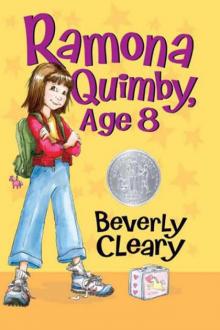 Ramona Quimby, Age 8
Ramona Quimby, Age 8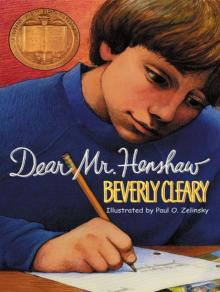 Dear Mr. Henshaw
Dear Mr. Henshaw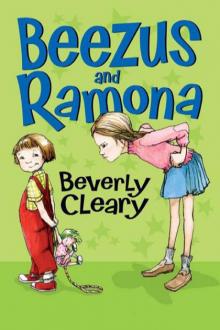 Beezus and Ramona
Beezus and Ramona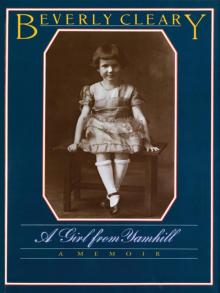 A Girl from Yamhill
A Girl from Yamhill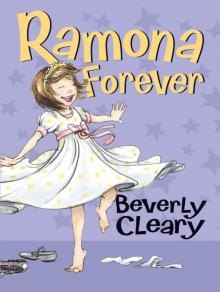 Ramona Forever
Ramona Forever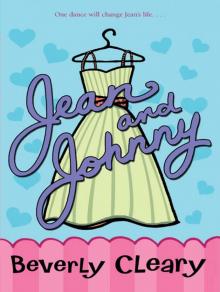 Jean and Johnny
Jean and Johnny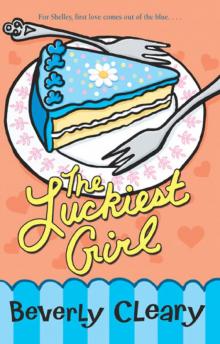 The Luckiest Girl
The Luckiest Girl Emily's Runaway Imagination
Emily's Runaway Imagination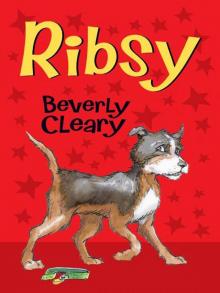 Ribsy
Ribsy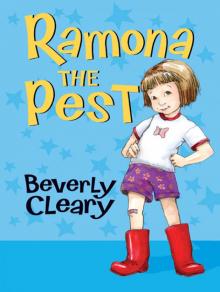 Ramona the Pest
Ramona the Pest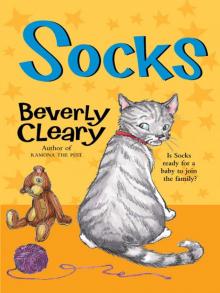 Socks
Socks Ramona's World
Ramona's World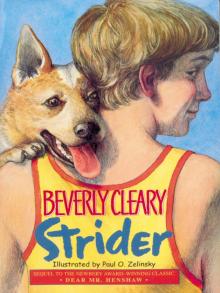 Strider
Strider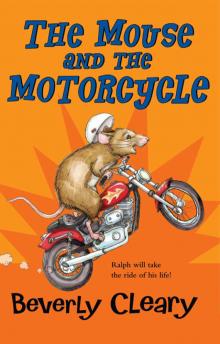 The Mouse and the Motorcycle
The Mouse and the Motorcycle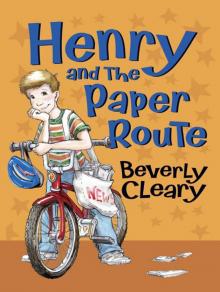 Henry and the Paper Route
Henry and the Paper Route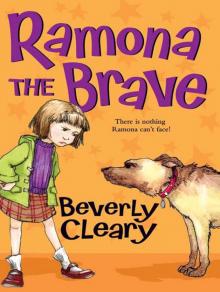 Ramona the Brave
Ramona the Brave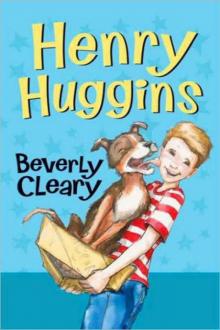 Henry Huggins
Henry Huggins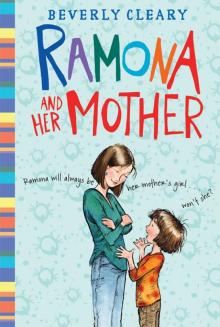 Ramona and Her Mother
Ramona and Her Mother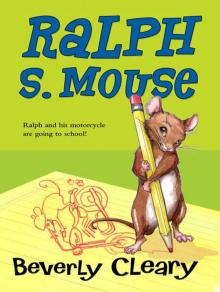 Ralph S. Mouse
Ralph S. Mouse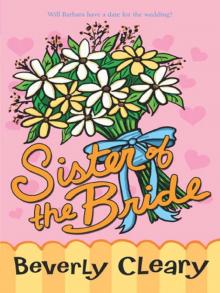 Sister of the Bride
Sister of the Bride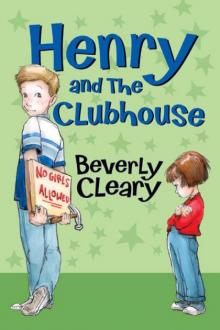 Henry and the Clubhouse
Henry and the Clubhouse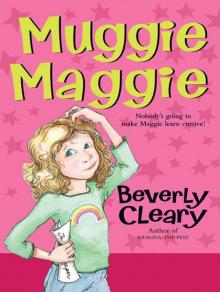 Muggie Maggie
Muggie Maggie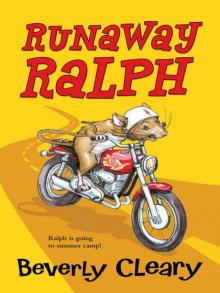 Runaway Ralph
Runaway Ralph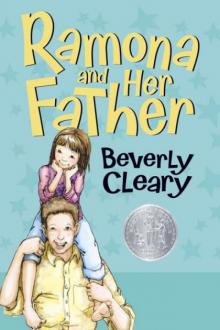 Ramona and Her Father
Ramona and Her Father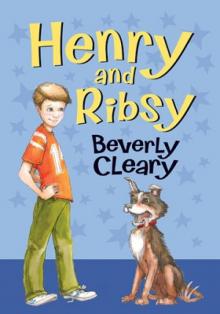 Henry and Ribsy
Henry and Ribsy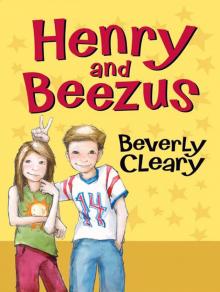 Henry and Beezus
Henry and Beezus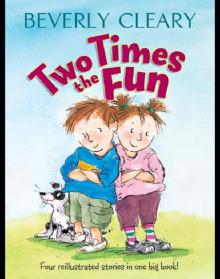 Two Times the Fun
Two Times the Fun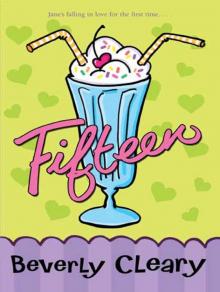 Fifteen
Fifteen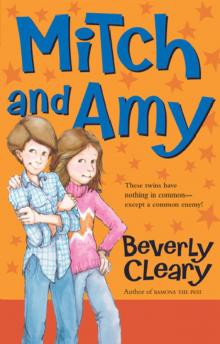 Mitch and Amy
Mitch and Amy